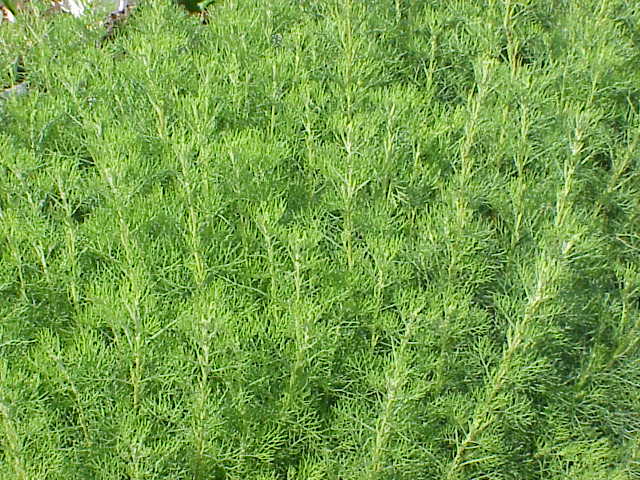Artemisia abrotanum. Lady's Love. Southernwood. (Southern Europe.) N. O. Compositæ. Tincture of fresh leaves and stems
Abrotanum
Coming soon... .. .
Introduction:This a very valuable remedy should be more frequently used. It is indicated in such conditions as are cured by Bryonia and Rhus tox., but its symptoms mark out its own individual cases.
Rheumatic conditions with heart irritation; epistaxis; bloody urine; anxiety and trembling, when there has been a history of diarrhoea. A suddenly checked diarrhoea will be followed by violent cardiac symptoms; it is much like Ledum, Aurum and Kalmia.
Marasmus: In marasmus of children it is a very useful remedy and not unfrequently indicated. The emaciation begins in the lower limbs and gradually spreads upward, so that the face is the last affected; that is the opposite of Lycopodium, Natrum mur. and Psorinum.
Chest: It has cured pleurisy after Bryonia, which seemed indicated, had failed. A woman lying in bed with dyspnoea, anxiety, cold sweat and pain in the heart was surrounded by friends to see her die.
It was learned that she had suffered for many months with a rheumatism in one knee, that she had used crutches to get about the house, and that she had recently been speedily cured (?) by a strong liniment only a few days before this attack. Abrot. restored her to health promptly.
It has caused and cured burning ulcerative pains in the stomach with suspicious vomiting.
Metastasis: Metastasis is a marked feature in Abrot. The changing of one so called disease into another always calls attention to Abrotanum. Inflammation of the parotid (mumps) changing to tests or mammae is generally cured by Carbo v. or Pulsatilla, but Abrot, has cured when these remedies have failed.
Suppression: A suddenly checked diarrhea followed by piles and acute rheumatism, with bleedings, as mentioned above, is further argument in favor of this idea.
The Abrot. patient is sensitive to cold air and cold damp weather. He suffers much from backaches, and his symptoms are worse during the night.
In boys it cures hydrocele.
In infants it cures bleeding from the navel.
Coming soon... .. .
Abrotanum.
Artemisia abrotanum. Lady's Love. Southernwood. (Southern Europe.) N. O. Compositæ. Tincture of fresh leaves and stems.
Clinical.─Boils. Chilblains. Epilepsy. Gout. Hæmorrhoids. Hectic fever. Hydrocele. Indigestion. Lienteria. Marasmus. Myelitis, chronic. Nose-bleed. Paralysis. Rheumatism. Umbilicus, oozing from. Worms.
Characteristics.─The most prominent symptom of Abrot. is the wasting it causes, most marked in lower extremities. It has also an intense indigestion and morbid appetite. There are burning, gnawing, constricting pains, and sometimes vomiting of offensive matters. A peculiar sensation is as if the stomach were hanging or swimming its water. After a checked diarrhœa, rheumatism may ensue. Another great characteristic of Abrot. is metastasis; metastatic rheumatism. Metastasis of rheumatism from joints to heart; to spine. There is a sudden aching pain in back > by motion. Symptoms are < at night and in cold air. The face is wrinkled, pale, old-looking; feels cold; blue rings round eyes. It is suited to affections of newborn children, and especially little boys; hydrocele; epistaxis; emaciation. Oozing of blood and moisture from navel of newborn. I have cured with it indigestion with vomiting of large quantities of offensive fluid in a middle-aged woman.
Relations.─Compare: Absinth., Cham., Cina, Gnaphal., and other Compositæ; Nux and Agar. (chilblains); Bry., Bar. c. Follows well: Acon. and Bry. (pleurisy); Hep. (boils).
SYMPTOMS.
1. Mind.─Great anxiety and depression.─Child cross, depressed, very peevish.─Feels she would like to do something cruel; no humanity.─Thinking difficult.─Feels as if brain softening.─Excited, loquacious, like shouting, good-humoured, happy (secondary, after ceasing the drug).
2. Head.─Cannot hold the head up.─The l. brain seems esp. weak, easily tired by conversation or mental effort.─Sensation as of creeping chills along the convolutions of the brain, accompanied by prickling sensation.─Scalp sore, esp. l. side; itching.
3. Eyes.─Blue rings around dull-looking eyes.
5. Nose.─Nose dry.─Nose-bleed with boys.
6. Face.─Face wrinkled, as if old.─Comedones, with emaciation.
8. Mouth.─Slimy taste; acid.
10. Appetite.─Gnawing hunger, craves bread boiled in milk.─Ravenous appetite, and all the while emaciating.─Gastralgia with loss of appetite.
11. Stomach.─Sensation as if stomach were hanging or swimming in water, with coldness.─Pains cutting, gnawing, burning; < at night.
12. Abdomen.─Great distension of abdomen.─Weak, sinking feeling in bowels.─Hard lumps in different parts of abdomen.
13. Stool and Anus.─Food passes undigested.─Rheumatism after suddenly checked diarrhœa.─Alternate diarrhœa and constipation.─Protruding piles, with burning, from touch or when pressing.─Piles appeared, and became worse as rheumatic pains abated, with frequent inclination to stool, hardly anything but blood being passed.─Destroys worms, esp. ascarides.
15. Male Sexual Organs.─Hydrocele of children.
16. Female Sexual Organs.─Darting pain in left ovary.─Twitching in both ovarian regions, seems to extend to back.─Blood and moisture oozing from navel of newborn.
17. Respiratory Organs.─Cold air causes a raw feeling in respiratory tract.─In pleurisy when a pressing sensation remains in affected side, impeding free breathing (after Acon. and Bry.).
19. Heart and Pulse.─Pain across chest sharp and severe in region of heart; rheumatism.─Metastasis of rheumatism to heart.─Pulse weak and small.
20. Back.─Pains in sacrum.
21. Limbs.─Inability to move.─Marasmus of lower extremities only.─Soreness and lameness; worse mornings.─Chilblains itch; frost-bitten limbs.─Gout in wrists and ankles.─Inflammatory rheumatism before swelling begins.
24. Generalities.─Weak, sickly feeling when excited, trembling.─Lame and sore all over.─Weak and prostrated after influenza.─Inability to move.─Numbness.
25. Skin.─Flabby; hangs loose; marasmus.─Furunculus; after Hep. s.
26. Sleep.─Restless; frightful dreams.
27. Fever.─High fever (rheumatism).─Hectic fever, with chilliness, very weakening; (marasmus).
Coming soon... .. .
Coming soon... .. .
Coming soon... .. .
Coming soon... .. .

Comments
Post a Comment